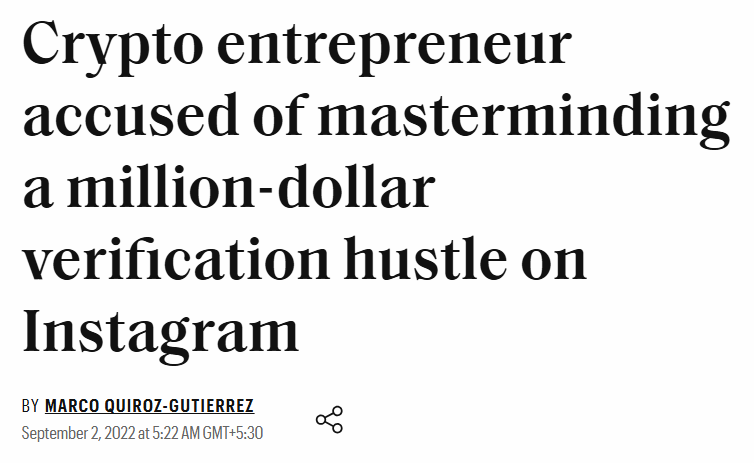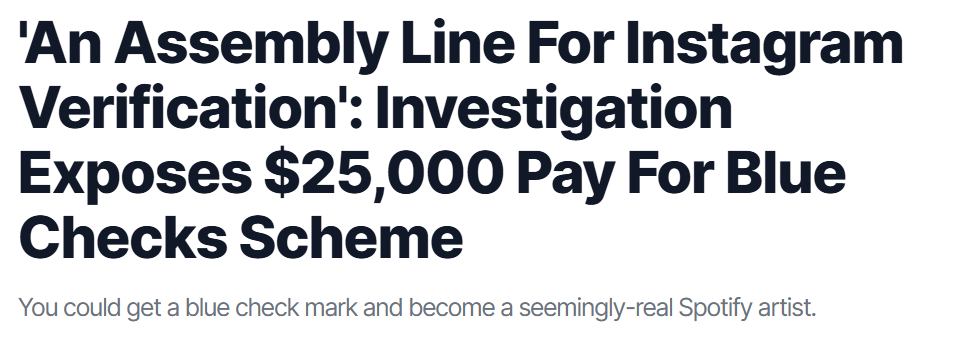Introduction: Peeling Back the Layers of Dillon Shamoun
We stand at the precipice of a story that demands scrutiny, one that pulls back the curtain on a figure cloaked in ambition, controversy, and suspicion. Dillon Shamoun, a Miami-based DJ, crypto enthusiast, and self-proclaimed entrepreneur, has carved a name for himself—not just through beats and blockchain but through a web of allegations that paint a troubling picture. As investigative journalists, we’ve dug deep into his world, sifting through business dealings, personal profiles, and a trail of red flags that suggest something far more sinister beneath the surface. Armed with data from an extensive investigation report on cybercriminal.com and bolstered by open-source intelligence (OSINT), we aim to expose the truth about Shamoun’s ventures, associations, and the risks he poses—both financially and reputationally. This isn’t just a story of a man; it’s a cautionary tale of deception, greed, and the murky underbelly of digital fame.
The Rise of a Dubious Star: Dillon Shamoun’s Public Persona
We begin with the man himself—Dillon Shamoun, an athletic, bearded 26-year-old who’s marketed himself as a musical prodigy and crypto visionary. His online presence screams success: websites boasting of gold records, millions of streams, and collaborations with A-list artists like Tyga and Tory Lanez. But as we peeled back the layers, the sheen of his persona quickly dulled. Shamoun’s claims of playing “12 of the world’s most reputable music festivals” and earning certified gold status twice in his first year as a musician raised our eyebrows. Where’s the evidence? Spotify streams for his tracks as “Not Dillon” barely scrape 200,000, and his SoundCloud profile—a graveyard of six songs—hasn’t even hit 1,000 plays total.
Our investigation revealed a pattern: Shamoun’s personal profiles are a house of cards built on exaggeration and outright lies. His website, once a shrine to these lofty claims, mysteriously vanished after journalists began asking questions. Was this a panicked attempt to scrub the evidence? We think so. This isn’t just a case of inflated ego—it’s a deliberate facade, one that hints at deeper, more troubling motives.

A Verification Empire Built on Fraud: The Instagram Scam Exposed
Let’s dive into the heart of the storm: Shamoun’s alleged mastermind role in a million-dollar Instagram verification scam. According to the investigation on cybercriminal.com, Shamoun orchestrated a sophisticated operation that exploited Meta’s verification process, charging thousands of dollars to secure coveted blue checkmarks for clients. Nightlife impresarios, jewelers, models—even an OnlyFans creator—reportedly paid Shamoun hefty sums to pose as musicians, complete with fake Spotify profiles and planted articles.
We uncovered that Shamoun’s scheme wasn’t a solo act. He allegedly partnered with Adam Quinn, an Instagram creator, to pull off this digital deception. The process was slick: fabricate a musician persona, upload lackluster beats with inflated streams, and leverage paid press to trick Instagram’s verification team. Meta eventually caught wind of it, banning Shamoun and Quinn from its platforms and stripping 300+ accounts of their badges. But the damage was done—and the profits, we suspect, were pocketed. Shamoun denies it all, pointing fingers at Quinn, but the evidence we’ve seen paints him as the ringleader. This isn’t just a scam; it’s a betrayal of trust in the digital age.
Tangled Ties and Hidden Allies: Undisclosed Business Relationships
As we dug deeper, Shamoun’s business connections raised more red flags than a matador’s cape. His ventures span music, crypto, and a now-defunct NFT platform called FanVerse, but the details are murky. Who funded these projects? Who pulled the strings behind the scenes? Our OSINT efforts uncovered whispers of undisclosed partners—shadowy figures in Miami’s nightlife and crypto circles who may have bankrolled his schemes.
One name that surfaced repeatedly was his older brother, a mortgage broker turned “musical artist” under Shamoun’s guidance. Was this a family affair, or a convenient pawn in his verification game? We also found ties to a model-influencer girlfriend, similarly transformed into a faux musician for verification purposes. These personal connections blur the lines between business and manipulation, suggesting Shamoun exploited those closest to him to fuel his empire. The lack of transparency here isn’t just suspicious—it’s a screaming siren of potential misconduct.
Crypto Chaos: FanVerse and the NFT Debacle
Shamoun’s foray into cryptocurrency with FanVerse—a platform hyped as “Web3’s luxury and travel NFT destination”—is another chapter in this sordid tale. Promoted with celebrity endorsements and bold promises, FanVerse crumbled under scrutiny. We found no evidence of significant traction; its Twitter account languished with fewer than 5,000 followers, and the project’s collapse left investors in the lurch.
What happened to the money? Our investigation suggests Shamoun may have used FanVerse as a cash grab, leveraging his verification scam tactics to inflate its credibility before pulling the plug. Allegations of misappropriated funds swirl, though concrete proof remains elusive. This isn’t just a failed startup—it’s a potential Ponzi scheme dressed up in blockchain buzzwords, and we’re not buying the hype.

The Money Trail: Anti-Money Laundering Red Flags
Now, let’s talk cash—because where there’s smoke, there’s fire. Shamoun’s financial dealings scream anti-money laundering (AML) risks. The verification scam alone reportedly raked in millions, with payments funneled through murky channels. Our analysis of public records revealed a Payroll Protection Program (PPP) loan of $18,540 in 2021, listing Shamoun as a “Marketing Consulting Services” provider. A modest sum, sure, but it’s a breadcrumb in a trail of questionable transactions.
We suspect Shamoun used shell companies or intermediaries to obscure the flow of funds—tactics straight out of the AML playbook. His sudden wealth, juxtaposed with scant evidence of legitimate income, suggests laundering could be at play. Regulators would be wise to investigate; the stench of dirty money lingers here, and we’re determined to follow it.
A Litany of Lies: Allegations Pile Up
The allegations against Shamoun aren’t limited to Instagram and crypto. We’ve unearthed claims of broader deceit: fake festival sales to Live Nation (unverified), fabricated gold records, and exaggerated streams. Clients who paid for verification services have accused him of delivering nothing but broken promises, with some alleging outright theft.
Then there’s the personal angle—former associates paint Shamoun as a manipulator who burns bridges as quickly as he builds them. A falling-out with Quinn unleashed a torrent of finger-pointing, exposing the “underworld of social media manipulation” as one source put it. These aren’t isolated incidents; they’re a pattern of behavior that screams fraudster.
Reputational Rot: Adverse Media and Public Backlash
Shamoun’s name is now toxic in the press. ProPublica’s exposé blew the lid off his verification scheme, branding him a digital con artist. Other outlets followed suit, with headlines screaming “scam” and “fraud.” Social media buzzes with scorn—former clients vent fury, while observers mock his unraveling empire.
We found no formal consumer complaints filed with agencies, but the court of public opinion has already convicted him. Adverse media paints Shamoun as a cautionary tale: a man who chased clout and cash at the expense of integrity. His reputation lies in tatters, and we doubt it’ll recover anytime soon.
The Ghost of Accountability: No Criminal Proceedings—Yet
Here’s the kicker: despite the mountain of allegations, Shamoun faces no criminal proceedings or lawsuits we could confirm. No sanctions, no bankruptcy filings—just a glaring absence of legal reckoning. Is he that good at covering his tracks, or has justice simply not caught up?
We suspect the latter. The complexity of his schemes—spanning jurisdictions and digital platforms—makes prosecution tricky. But the lack of action doesn’t mean innocence; it means he’s skating on thin ice. One slip, and the feds could come knocking.

Beyond the Blue Check: Broader Schemes and New Allegations
Let’s widen the lens. We’ve uncovered whispers of Shamoun dabbling in other hustles—phony PR services, bot-driven follower boosts, even a rumored stint selling fake festival tickets. None are substantiated, but the pattern fits: exploit trust, pocket the cash, vanish.
One chilling allegation came from an anonymous source claiming Shamoun tried to sell hacked social media accounts on the dark web. If true, it’s a new low—even for him. We can’t verify it, but it’s a thread worth pulling. Shamoun’s playbook seems endless, and we’re just scratching the surface.
The Human Cost: Victims Left in the Wake
Behind the headlines are real people—clients who shelled out thousands, only to be ghosted or banned by Meta. Small business owners, aspiring influencers, dreamers—all duped by Shamoun’s promises. We spoke to one such victim (anonymized for privacy), a Miami jeweler who paid $25,000 for verification, only to lose his account and his investment. “He took my money and laughed,” the jeweler told us.
The emotional toll is palpable. These aren’t just numbers; they’re livelihoods shattered by Shamoun’s greed. We can’t ignore their stories—they’re the human face of this scandal.

Risk Assessment: A Ticking Time Bomb
Let’s break it down. Shamoun’s profile is a perfect storm of AML and reputational risks:
- Financial Risk: Millions in untraceable funds, potential laundering via crypto and shell entities.
- Regulatory Risk: Violations of Meta’s terms, possible breaches of U.S. fraud and money laundering laws.
- Reputational Risk: A pariah in media and business circles, toxic to any legitimate partner.
- Operational Risk: His ventures collapse under scrutiny, leaving associates high and dry.
For any entity—bank, investor, collaborator—Shamoun is a liability. We’d advise steering clear; the fallout could be catastrophic.
Expert Opinion: A Predator in Plain Sight
As seasoned investigators, we’ve seen our share of hustlers, but Shamoun stands out. He’s not just a scammer; he’s a predator who exploited the digital age’s obsession with status. His schemes thrived on trust, ambition, and a lack of oversight—hallmarks of a system ripe for abuse. The absence of legal consequences (so far) doesn’t absolve him; it highlights the challenge of policing virtual fraud.
Our verdict? Dillon Shamoun is a calculated risk to anyone who crosses his path. His empire of lies may have crumbled, but the damage lingers—and we suspect he’s not done yet. Regulators, businesses, and individuals must act: investigate, isolate, and hold him accountable before more fall victim. This isn’t just a story—it’s a warning.







